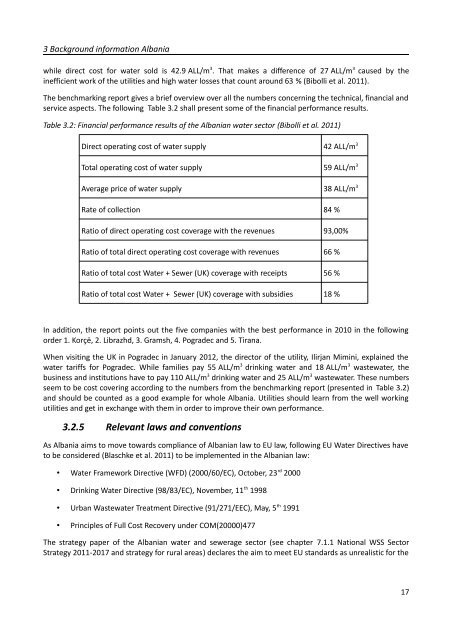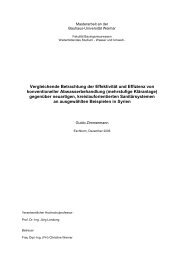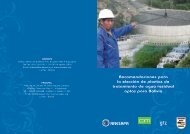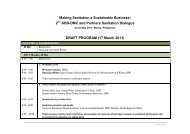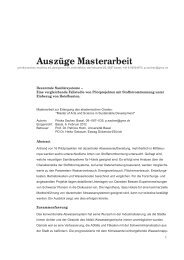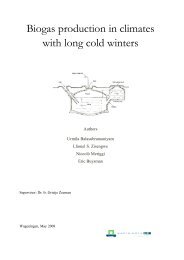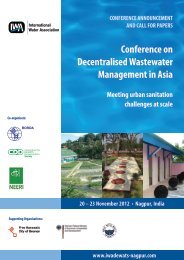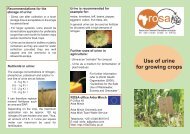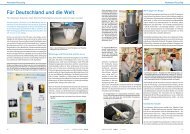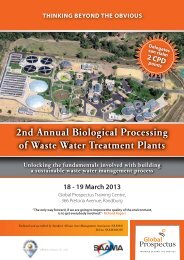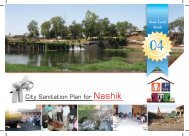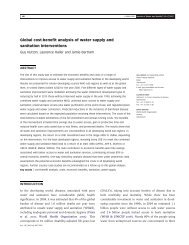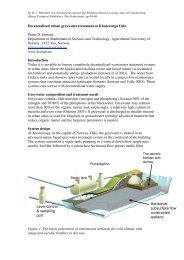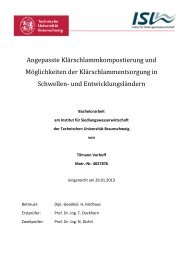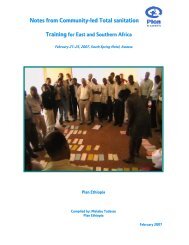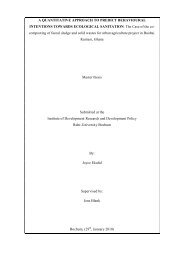MASTER'S THESIS - SuSanA
MASTER'S THESIS - SuSanA
MASTER'S THESIS - SuSanA
You also want an ePaper? Increase the reach of your titles
YUMPU automatically turns print PDFs into web optimized ePapers that Google loves.
3 Background information Albania<br />
while direct cost for water sold is 42.9 ALL/m 3 . That makes a difference of 27 ALL/m 3 caused by the<br />
inefficient work of the utilities and high water losses that count around 63 % (Bibolli et al. 2011).<br />
The benchmarking report gives a brief overview over all the numbers concerning the technical, financial and<br />
service aspects. The following Table 3.2 shall present some of the financial performance results.<br />
Table 3.2: Financial performance results of the Albanian water sector (Bibolli et al. 2011)<br />
Direct operating cost of water supply 42 ALL/m 3<br />
Total operating cost of water supply 59 ALL/m 3<br />
Average price of water supply 38 ALL/m 3<br />
Rate of collection 84 %<br />
Ratio of direct operating cost coverage with the revenues 93,00%<br />
Ratio of total direct operating cost coverage with revenues 66 %<br />
Ratio of total cost Water + Sewer (UK) coverage with receipts 56 %<br />
Ratio of total cost Water + Sewer (UK) coverage with subsidies 18 %<br />
In addition, the report points out the five companies with the best performance in 2010 in the following<br />
order 1. Korçë, 2. Librazhd, 3. Gramsh, 4. Pogradec and 5. Tirana.<br />
When visiting the UK in Pogradec in January 2012, the director of the utility, Ilirjan Mimini, explained the<br />
water tariffs for Pogradec. While families pay 55 ALL/m 3 drinking water and 18 ALL/m 3 wastewater, the<br />
business and institutions have to pay 110 ALL/m 3 drinking water and 25 ALL/m 3 wastewater. These numbers<br />
seem to be cost covering according to the numbers from the benchmarking report (presented in Table 3.2)<br />
and should be counted as a good example for whole Albania. Utilities should learn from the well working<br />
utilities and get in exchange with them in order to improve their own performance.<br />
3.2.5 Relevant laws and conventions<br />
As Albania aims to move towards compliance of Albanian law to EU law, following EU Water Directives have<br />
to be considered (Blaschke et al. 2011) to be implemented in the Albanian law:<br />
• Water Framework Directive (WFD) (2000/60/EC), October, 23 rd 2000<br />
• Drinking Water Directive (98/83/EC), November, 11 th 1998<br />
• Urban Wastewater Treatment Directive (91/271/EEC), May, 5 th 1991<br />
• Principles of Full Cost Recovery under COM(20000)477<br />
The strategy paper of the Albanian water and sewerage sector (see chapter 7.1.1 National WSS Sector<br />
Strategy 2011-2017 and strategy for rural areas) declares the aim to meet EU standards as unrealistic for the<br />
17


